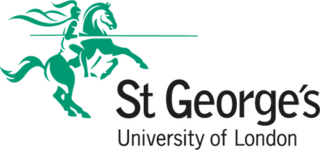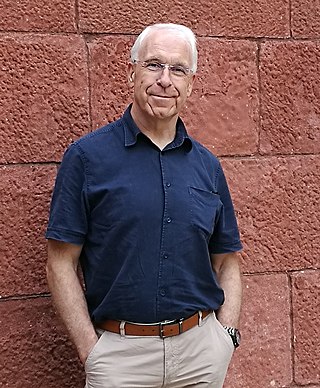The Albert Einstein College of Medicine is a private medical school in New York City. Founded in 1953, Einstein operates as an independent degree-granting institution as part of the integrated healthcare Montefiore Health System and also has affiliations with Jacobi Medical Center and Yeshiva University.

St George's, University of London, legally St George's Hospital Medical School, is a public university in Tooting, South London, England, and is a member institution of the federal University of London. In August 2024, St George's will merge with City, University of London to form City St George's, University of London.
Josemir W. Sander, also known as Ley Sander, is a Professor of Neurology and Clinical Epilepsy, and the head of Department of Clinical and Experimental Epilepsy, at UCL Queen Square Institute of Neurology. He is also a Professor of Neurology at West China Hospital, Sichaun University in Chengdu, China.
Translational medicine develops the clinical practice applications of the basic science aspects of the biomedical sciences; that is, it translates basic science to applied science in medical practice. It is defined by the European Society for Translational Medicine as "an interdisciplinary branch of the biomedical field supported by three main pillars: benchside, bedside, and community". The goal of translational medicine is to combine disciplines, resources, expertise, and techniques within these pillars to promote enhancements in prevention, diagnosis, and therapies. Accordingly, translational medicine is a highly interdisciplinary field, the primary goal of which is to coalesce assets of various natures within the individual pillars in order to improve the global healthcare system significantly.

A Medical Laboratory Scientist (MLS) or Clinical Laboratory Scientist (CLS) or Medical Technologist (MT) performs diagnostic testing of blood and body fluids in clinical laboratories. The scope of a medical laboratory scientist's work begins with the receipt of patient or client specimens and terminates with the delivery of test results to physicians and other healthcare providers. The utility of clinical diagnostic testing relies squarely on the validity of test methodology. To this end, much of the work done by medical laboratory scientists involves ensuring specimen quality, interpreting test results, data-logging, testing control products, performing calibration, maintenance, validation, and troubleshooting of instrumentation as well as performing statistical analyses to verify the accuracy and repeatability of testing. Medical laboratory scientists may also assist healthcare providers with test selection and specimen collection and are responsible for prompt verbal delivery of critical lab results. Medical Laboratory Scientists in healthcare settings also play an important role in clinical diagnosis. An estimated 70% of medical decisions are based on laboratory test results and MLS contributions affect 95% of a health system's costs.

Lisa Feldman Barrett is a University Distinguished Professor of psychology at Northeastern University, where she focuses on affective science. She is a director of the Interdisciplinary Affective Science Laboratory. Along with James Russell, she is the founding editor-in-chief of the journal Emotion Review. Along with James Gross, she founded the Society for Affective Science.

The Cambridge Biomedical Campus is the largest centre of medical research and health science in Europe. The site is located at the southern end of Hills Road in Cambridge, England.

Philippa "Pippa" Marrack, FRS is an English immunologist and academic, based in the United States, best known for her research and discoveries pertaining to T cells. Marrack is the Ida and Cecil Green Professor and chair of the Department of Biomedical Research at National Jewish Health and a distinguished professor of immunology and microbiology at the University of Colorado Denver.
Sir John Irving Bell is a Canadian-British immunologist and geneticist. From 2006 to 2011, he was President of the United Kingdom's Academy of Medical Sciences, and since 2002 he has held the Regius Chair of Medicine at the University of Oxford. He was since 2006 Chairman of the Office for Strategic Coordination of Health Research (OSCHR) but in 2020 became a normal member. Bell was selected to the Vaccine Taskforce sometime before 1 July 2020. Bell is also on the board of directors of the SOE quango Genomics England.
Translational research is research aimed at translating (converting) results in basic research into results that directly benefit humans. The term is used in science and technology, especially in biology and medical science. As such, translational research forms a subset of applied research.
Sir Edward Byrne is a neuroscientist who served as Principal of King's College London from August 2014 until January 2021. He was previously Vice-Chancellor of Monash University.

Christofer "Chris" Toumazou, CEng is a British Cypriot electronic engineer. He is perhaps best known for inventing a fast and portable means of genome sequencing, following his 13-year-old son's diagnosis with end stage kidney failure through a rare genetic mutation.
Dame Anna Felicja Dominiczak DBE FRCP FRSE FAHA FMedSci is a Polish-born British medical researcher, Regius Professor of Medicine - the first woman to hold this position, and the Chief Scientist (Health) for the Scottish Government. From 2010 to 2020, Dominiczak was the Vice-Principal and Head of the College of Medical, Veterinary and Life Sciences at the University of Glasgow, Scotland. She is an Honorary Consultant Physician and Endocrinologist for the NHS Greater Glasgow and Clyde Health Board, and Health Innovation Champion for the Medical Research Council. From 2013 to 2015, Dominiczak was president of the European Society of Hypertension. She is the current Editor-in-Chief of Precision Medicine, a new journal launched in July 2023.

Brian J. Druker is a physician-scientist at Oregon Health & Science University (OHSU), in Portland, Oregon. He is the director of OHSU's Knight Cancer Institute, JELD-WEN Chair of Leukemia Research, Associate Dean for Oncology in the OHSU School of Medicine, and professor of medicine.

Biomedical sciences are a set of sciences applying portions of natural science or formal science, or both, to develop knowledge, interventions, or technology that are of use in healthcare or public health. Such disciplines as medical microbiology, clinical virology, clinical epidemiology, genetic epidemiology, and biomedical engineering are medical sciences. In explaining physiological mechanisms operating in pathological processes, however, pathophysiology can be regarded as basic science.

Malini Olivo is the Distinguished Principal Scientist of A*STAR Skin Research Labs (A*SRL) where she spearheads the Translational Biophotonics Laboratory. Concurrently, she is also an Adjunct Professor at the Department of Obstetrics & Gynaecology, National University Health System, NUS, Singapore; and Royal College of Surgeons Ireland, Dublin, Ireland. In 2015, she was elected by the Optical Society of America for "pioneering contribution in clinical photodiagnostics in the area of clinical spectroscopy and imaging in early cancer detection and photo-therapeutics of cancer".

Sir Stephen Patrick O'Rahilly is an Irish-British physician and scientist known for his research into the molecular pathogenesis of human obesity, insulin resistance and related metabolic and endocrine disorders.

Julie Makani is a Tanzanian medical researcher. From 2014 she is Wellcome Trust Research Fellow and Associate Professor in the Department of Haematology and Blood Transfusion at the Muhimbili University of Health and Allied Sciences (MUHAS). Also a visiting fellow and consultant to the Nuffield Department of Medicine, University of Oxford, she is based in Dar es Salaam, Tanzania. In 2011, she received the Royal Society Pfizer Award for her work with sickle cell disease.

Roger Watson is a British academic and Honorary Professor at the University of Hull.

Jonathan S. Lewin is an American neuroradiologist specializing in medical imaging research with an emphasis on the investigation, development, and translation of new magnetic resonance imaging (MRI) techniques. He is the former executive vice president for health affairs (EVPHA) and executive director of the Woodruff Health Sciences Center for Emory University, and former President, CEO, and chairman of the board of Emory Healthcare. He currently serves as professor of radiology, biomedical engineering, and neurosurgery in the Emory School of Medicine and as professor of health policy and management in the Rollins School of Public Health.
















